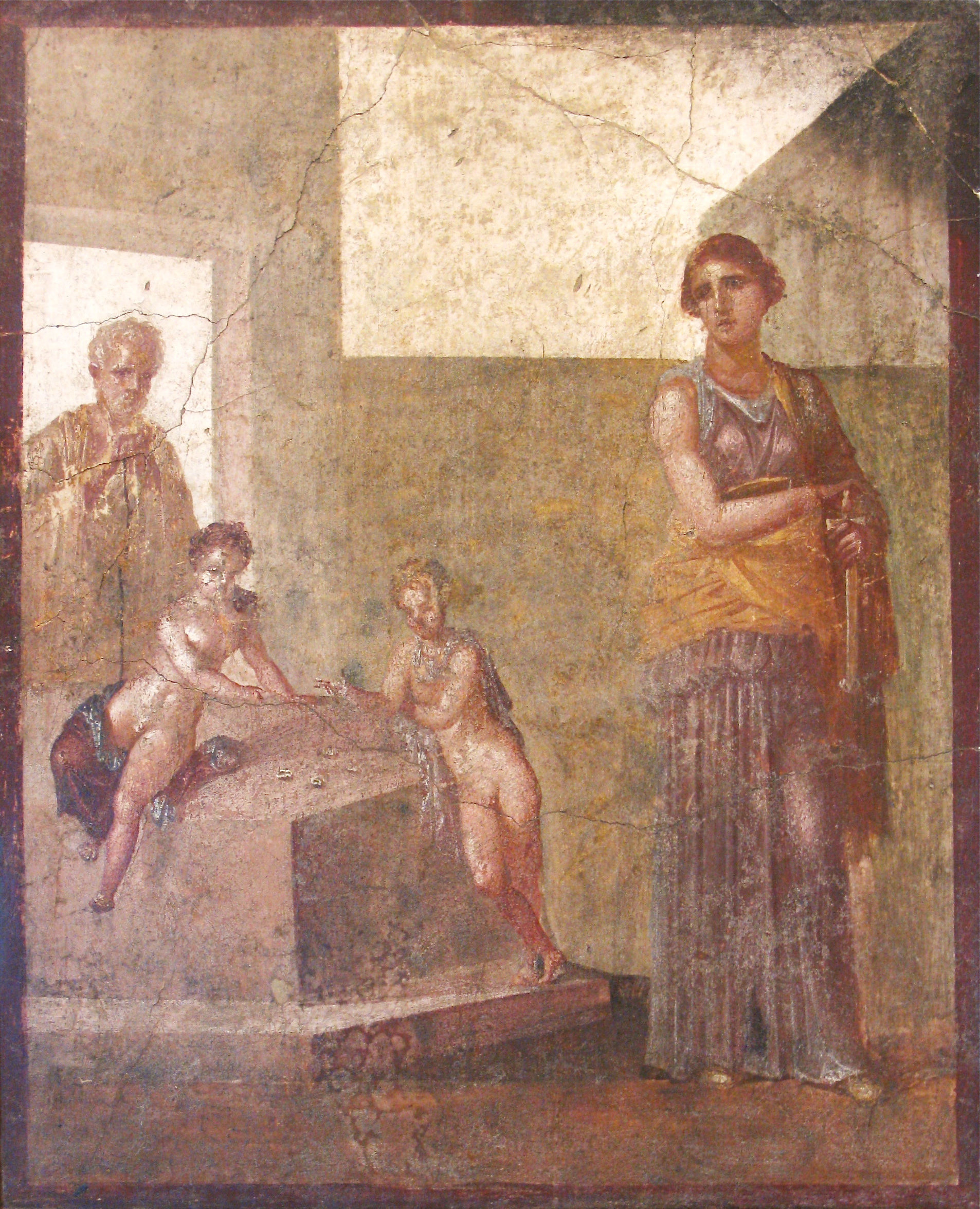Timomachus on:
[Wikipedia]
[Google]
[Amazon]
 Timomachus of Byzantium (or Timomachos, a transliteration of Τιμόμαχος) was an influential painter of the first century BCE.
Timomachus of Byzantium (or Timomachos, a transliteration of Τιμόμαχος) was an influential painter of the first century BCE.
Works
Pliny the Elder
Gaius Plinius Secundus (AD 23/2479), called Pliny the Elder (), was a Roman author, naturalist and natural philosopher, and naval and army commander of the early Roman Empire, and a friend of the emperor Vespasian. He wrote the encyclopedic ...
, in his ''Naturalis Historia
The ''Natural History'' ( la, Naturalis historia) is a work by Pliny the Elder. The largest single work to have survived from the Roman Empire to the modern day, the ''Natural History'' compiles information gleaned from other ancient authors. ...
'' (35.136), records that Julius Caesar had acquired two paintings by Timomachus, one of ''Ajax
Ajax may refer to:
Greek mythology and tragedy
* Ajax the Great, a Greek mythological hero, son of King Telamon and Periboea
* Ajax the Lesser, a Greek mythological hero, son of Oileus, the king of Locris
* ''Ajax'' (play), by the ancient Gree ...
'' during his madness, and a ''Medea
In Greek mythology
A major branch of classical mythology, Greek mythology is the body of myths originally told by the ancient Greeks, and a genre of Ancient Greek folklore. These stories concern the origin and nature of the world, the ...
'' meditating the slaying of her children, which cost him the considerable sum of 80 talent
Talent has two principal meanings:
* Talent (measurement), an ancient unit of mass and value
* Talent (skill), a group of aptitudes useful for some activities; talents may refer to aptitudes themselves or to possessors of those talents
Talent ma ...
s. Scholars have connected these works with the carrying away of a ''Medea'' and ''Ajax'' from Cyzicus
Cyzicus (; grc, Κύζικος ''Kúzikos''; ota, آیدینجق, ''Aydıncıḳ'') was an ancient Greek town in Mysia in Anatolia in the current Balıkesir Province of Turkey. It was located on the shoreward side of the present Kapıdağ Peni ...
, an ancient port of Anatolia
Anatolia, tr, Anadolu Yarımadası), and the Anatolian plateau, also known as Asia Minor, is a large peninsula in Western Asia and the westernmost protrusion of the Asian continent. It constitutes the major part of modern-day Turkey. The r ...
, mentioned in Cicero
Marcus Tullius Cicero ( ; ; 3 January 106 BC – 7 December 43 BC) was a Roman statesman, lawyer, scholar, philosopher, and academic skeptic, who tried to uphold optimate principles during the political crises that led to the est ...
's ''In Verrem
"In Verrem" ("Against Verres") is a series of speeches made by Cicero in 70 BC, during the corruption and extortion trial of Gaius Verres, the former governor of Sicily. The speeches, which were concurrent with Cicero's election to the aedileship ...
'' (2.4.135), and propose that Caesar acquired them there, shortly after his victory at Pharsalus
''Pharsalus''Melichar L (1906) ''Monographie der Issiden. (Homoptera). Abhandlungen der K. K. Zoologisch-botanischen Gesellschaft in Wien.'' Wien 3: 1-327 21 is the type genus of planthoppers in the subfamily Pharsalinae (family Ricaniidae); ...
. The paintings, "a pair linked to each other by their rage", were installed in front of the Temple of Venus Genetrix
The Temple of Venus Genetrix (Latin: ''Templum Veneris Genetricis'') is a ruined temple in the Forum of Caesar, Rome, dedicated to the Roman goddess ''Venus Genetrix'', the founding goddess of the Julian gens. It was dedicated to the goddess on S ...
, and remained there until their destruction by fire in 80 CE.
The ''Anthology of Planudes
The ''Anthology of Planudes'' (also called ''Planudean Anthology'', in Latin ''Anthologia Planudea'' or sometimes in Greek ''Ἀνθολογία διαφόρων ἐπιγραμμάτων'' ("Anthology of various epigrams"), from the first line of ...
'' preserves a number of epigram
An epigram is a brief, interesting, memorable, and sometimes surprising or satirical statement. The word is derived from the Greek "inscription" from "to write on, to inscribe", and the literary device has been employed for over two mille ...
s on the ''Medea'', which note its incomplete state, and praise its emotional intensity and verisimilitude
In philosophy, verisimilitude (or truthlikeness) is the notion that some propositions are closer to being true than other propositions. The problem of verisimilitude is the problem of articulating what it takes for one false theory to be clos ...
. Scholars believe that two well-known depictions of Medea preserved at Pompeii were composed under the influence of Timomachus' work.
References
Ancient Greek painters 1st-century BC Greek people 1st-century BC painters {{AncientGreece-bio-stub